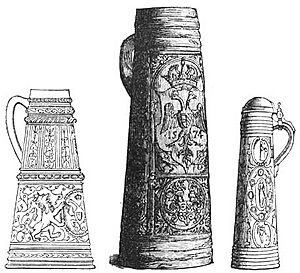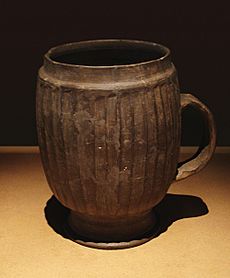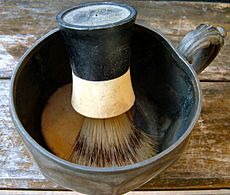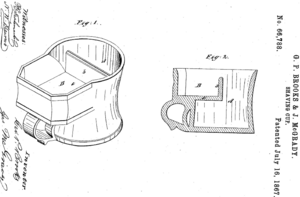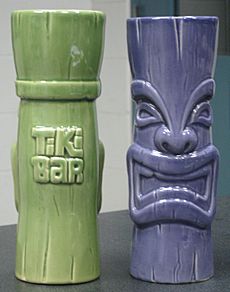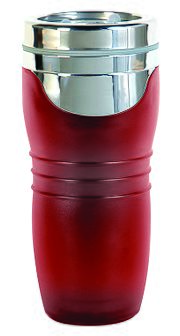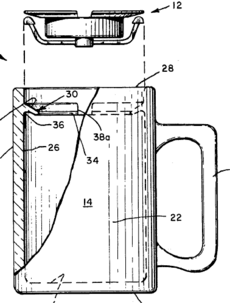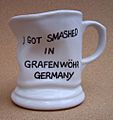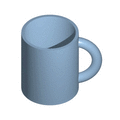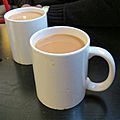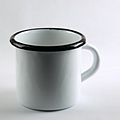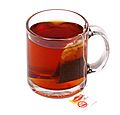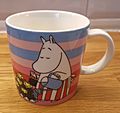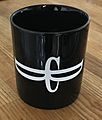Mug facts for kids

A mug is a special kind of container used for drinking. It usually has a single handle on its side, making it easy to hold. Mugs are often made from materials like ceramic or steel. People commonly use mugs to drink things like coffee in the morning or other hot beverages.
History
Early mugs
Long ago, people probably made mugs from wood. However, most of these old wooden mugs have not lasted until today.
The first pottery was shaped by hand. Later, the invention of the potter's wheel made it much easier to create pottery. This allowed people to easily add a handle to a cup, creating the first mugs. For example, a fancy clay mug from 4000–5000 BCE was found in Greece.
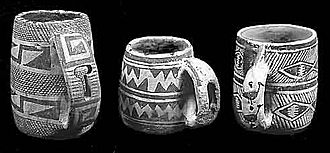
Early clay mugs had thick walls, which were not always comfortable for drinking. As people learned more about working with metals, they could make thinner walls. Metal mugs were made from materials like bronze, silver, gold, and even lead, starting around 2000 BCE. But these metal mugs were not good for hot drinks.
A big change happened around 600 CE in China with the invention of porcelain. Porcelain allowed for thin-walled mugs that were perfect for both hot and cold drinks. These are much like the mugs we use today.
Shaving mugs
In the 1800s, special mugs called shaving scuttles and shaving mugs became popular. The first patent for a shaving mug was given in 1867. Back then, many homes did not have easy access to hot water. These mugs helped people create warm, foamy lather for shaving.
A traditional shaving scuttle looks a bit like a teapot with a wide spout. Hot water was poured into this spout. A shaving mug, on the other hand, does not have a spout. Both usually have a handle, but some do not. Shaving mugs often look like regular mugs, but some have a special rest for a shaving brush.
At the top of the scuttle or mug, there is a holder for a block of shaving soap. Older versions had small holes at the bottom to drain water. Newer ones do not have these holes, so they can be used with softer soaps or creams. Some mugs have circles on the bottom to help make more lather.
To use one, a shaving brush was dipped into the hot water in the scuttle to warm up. Then, the soap was placed in its holder. The brush was rubbed against the soap to create a layer of lather. This method helped save water and soap, while keeping the lather warm for a good shave.
Tiki mugs
Tiki mugs are drinking cups, usually made of ceramic. They became popular in the mid-1900s in tropical-themed restaurants and tiki bars. The term "Tiki mugs" refers to mugs that look like sculptures. They often show images from places like Melanesia, Micronesia, or Polynesia. More recently, they can show anything tropical or related to surfing.
Tiki mugs are often sold as souvenirs and are very popular among collectors. Today, companies like Muntiki and Tiki Farm make them. Some artists, like Van Tiki, also create unique, handmade tiki mugs.
Travel mugs
Travel mugs, first made in the 1980s, are designed to keep drinks hot or cold. They work a lot like a vacuum flask. A travel mug is usually well-insulated and fully sealed to stop spills or leaks. It has an opening in the lid so you can drink while you are moving. Even a simple plastic lid helps keep drinks hot by stopping steam from escaping.
Mugs with an inner and outer wall, but without a vacuum between them, are called double-wall mugs. The inner wall is usually made of stainless steel. The outer wall can be stainless steel, plastic, or other materials.
Mugs made for use while driving are called auto mugs or commuter mugs. They let people enjoy a drink safely while driving. Travel mugs have a spill-proof lid with a sipping opening. Many also have a narrower base so they fit into the cup-holders found in most vehicles.
Images for kids
-
A continuous change between a coffee mug and a donut showing they are topologically equivalent
-
Frog mug, Toad or Surprise mug
See also
 In Spanish: Taza grande para niños
In Spanish: Taza grande para niños
 | Emma Amos |
 | Edward Mitchell Bannister |
 | Larry D. Alexander |
 | Ernie Barnes |


